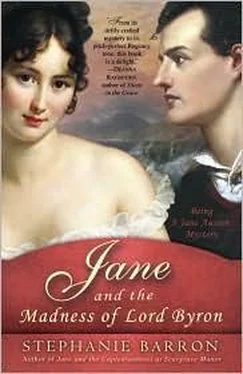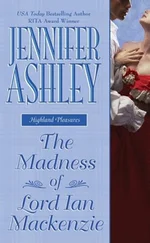“I have known Caroline Lamb long enough to declare that while she is an accomplished little liar, she rarely tries it on in publick,” she told us. “Every word she uttered today, whether in a whisper or a screech, was potently true, was it not, Mona?”
“I could not undertake to say,” stammered the Countess of Swithin. “Certainly as regards the more intimate of her barbs, I cannot be allowed to have an opinion.”
Lady Oxford made a dismissive gesture with her hand; my black-hemmed square of lawn fluttered away behind the dashing phaeton. “But the gist of it, Mona: Byron was in love with the girl?—This Twining chit? And has been deceiving me liberally the whole spring long? When I believed him besotted— ”
The Countess of Swithin was silent an instant, as tho’ marshalling her arguments. I may say that despite the necessity of preserving her wits and temper in the face of her friend’s turbulent spirits, she continued to drive her demanding team to the very inch , for which I was no end grateful.
“Who can tell what George Gordon truly feels in that place he claims for a heart?” she declared at last. “Never having penetrated it, my dear, I should not attempt to say. Certainly he conceived a passion for Catherine Twining—but whether as a man , or a poet inspired by a particular muse , who knows? The girl was the merest child! And he has always been enslaved by ladies of more … experience … and … and maturity … as you know. Such innocence as Catherine displayed could not have captivated him long.”
Lady Oxford drew a shuddering breath and closed her eyes. She ought to have been reassured by her friend’s words, but her face was become a mask, distracted and anxious; Desdemona had only increased her misery.
“With those of Byron’s stamp,” her ladyship persisted, “it must be enough to figure in his imagination; one can never hope to possess it solely, as one might with a lesser Genius. You have been Aspasia, your little daughter has been Ianthe—must you strive to be his Leila too?”
There it was, again: that haunting name, so evocative of climes far from England’s shores. Caro Lamb had caught it; from Byron himself—or Catherine Twining?
“It was Caro who named me thus, not Byron,” Lady Oxford said, reverting to the first part of Mona’s sentence. “Aspasia—for Socrates’ wise mistress. We used to meet so often, in past years, to talk over the latest radical ideas—there is a wild Genius, when all is said, to Caro’s understanding. Mad she may be, untamed her heart shall always be—but there is nothing deficient in her intellect. Indeed, there are few women I should prefer to meet, had this unfortunate break not come between us.”
She spoke as tho’ the break had not been of her making—and yet, I thought with amazement bordering on revulsion, there had been a choice when she succumbed to Byron’s ardour. Lady Oxford had certainly known of Caro Lamb’s amorous history—that lady had made a gift of every detail to her entire world. But Jane Harley had deliberately taken as her lover the man who had discarded her dear friend. That both ladies were married already was of the slightest consequence, it seemed.
Aspasia , indeed!
I should never become accustomed to the casual betrayals that served as bread-and-butter to the haut ton .
THE COUNTESS OF SWITHIN SEEMED LESS INCLINED TO AN intimate dinner with Lady Oxford, now that her friend was decidedly blue-deviled, and was most pressing in her invitation to both Henry and me to swell their family party. But I pled weariness, and remained firm in declining all frivolity. As I stepped down from the phaeton before the Castle’s door, and walked round to Mona’s side to curtsey my thanks, she leaned from her seat and muttered, “I shall urge the Countess to trust you entirely , dearest Jane, with references to my brother Kinsfell, and your perspicacity on numerous occasions—indeed, it should be enough to mention my uncle Trowbridge’s regard, for they were as intimate as two peas in a pod, you know. I shall write to you on the morrow—provided my friend is not taken up for the murder of Lord Byron in the interval—”
With a roguish smile and a flick of her whip, she left me to turn slowly into the comparative peace of the inn, in search of my comfortable dinner—which was fated to be discomposed by fruitless pondering of the terms intimate and peas in a pod .
Had Lord Harold, too, been Lady Oxford’s slave? What had he called her—Aspasia, Ianthe, or simply Jane ?
I was unaccountably brusque with Henry throughout the evening.
“BY THE BY, JANE,” HE SAID AS THE GUINEA FOWL, TURBOT, radishes, and shrimps were removed, and a dish of pears in jellied wine and a syllabub were set before us, along with half a local cheese—“you have not asked me one word about my conversation with Scrope Davies. I thought you intended for me to pump the fellow!”
As the better part of Henry’s conversation had concerned horses during dinner—the various points of those in the field, and those capable of completely outshining it, that had scratched at the last moment due to strained hocks, or other vagaries of Fortune; the obscure genealogy of Lord Wyncourt’s colt, which was said to require a fomenting of the knees as a result of its fall; the practices pursued by the Earl of Swithin on his estates in Ireland, where the bay mare had been bred; and the general outcome of the betting—I found this declaration self-serving, if not openly unjust.
I stabbed the cheese with a spoon. “I should like to hear what you thought of the gentleman.”
“Oh! As to that—he’s an excellent fellow! Highly intelligent, with an air of Fashion, and unfailingly good ton . I could wish him rather more plump in the pocket—he ought to bag an heiress one of these days, but the mammas are all against him, smelling the fortune-hunter. It is a sad thing when a man of no particular profession sets up as a Dandy—without he carries a title, or the expectation of an inheritance, the Polite World is apt to look askance. However, there is nothing to quarrel with in the tying of Davies’s cravat, or the set of his coat; he moves in the first circles, and if he does play too deep at basset, I am sure it is no affair of mine. He banks with Coutts.”
“Henry,” I said with a commendable effort at controlling my temper, “did Eliza never tell you that you are the most infuriating Henry in all the world?”
“Eliza doted on me, as well she ought.” He tossed a grape in the air and caught it between his teeth, as tho’ he had been yet a boy; and it occurred to me that he must have placed a good deal of money on the bay mare, for his spirits verged on the giddy.
“Out with it,” I commanded. “How much did you win?”
“Seven hundred guineas.”
I sat back in my chair, astounded. Such a princely sum should never have entered my head—and the betting surely had not argued such massive winnings—the bay mare was the clear favourite stepping out of the post—
“You bet against Caro Lamb,” I said. “Didn’t you?”
“Having seen that lady come to grief on the shingle, did you expect me to back her on the turf?” he retorted drily. “For all I could judge, her ladyship was likely to ride as poorly as she swam . It was a close-run thing, of course—the colt very nearly cleared that final jump, and had Lady Caroline placed, it should have been bellows to mend with me.… May I offer you a grape, Jane?”
I will never underestimate the reckless disregard of bankers.
I shook my head, and concentrated on consuming a bite of cheese.
Читать дальше












